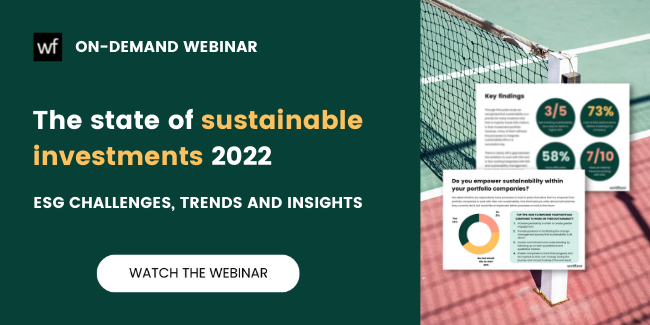3 actionable reasons why US private equity companies should start ESG monitoring now

While the business value of sustainability is still debated by some, tracking Environmental, Social and Governance (ESG) and dedicated ESG funds are inevitably on the rise worldwide. Companies focusing on ESG are being proved to outperform those who don’t pay attention to long-term values and consumers are screaming for more sustainable alternatives.
So why should PE companies start their ESG journey now? In this blog we will cover three concrete reasons – read on to learn what they are.
What is ESG monitoring?
ESG monitoring is a way for investors to track Environmental, Social and Governance (ESG) metrics in order to detect risk, follow performance and align funds with responsible objectives. ESG monitoring helps investors to make decisions about their investees’ alignment with their values and ethics. As a prerequisite to purposeful ESG monitoring, ESG screening and due diligence should be integrated in the process.
1. Comply with local environmental laws
ESG is a fairly new area to many investors today due to the lack of existing legal frameworks in the US. The role of ESG is, however, growing and the landscape in the investment sector is no exception. The Securities and Exchange Commision (SEC) recently proposed a change to existing regulation requiring publicly traded companies and investors to report on certain climate-related metrics. The change would imply that investors in the US would have to start reporting more ESG data, but it would also give a standardized way to access consistent and comparable information that could be used for making more purposeful investment decisions.
2. Assess stakeholder compliance in other markets
Make sure you know where your stakeholders are located, whether it’s a portfolio company of yours or an LP who’s invested in you as a PE. Different countries might have local reporting regulations that companies are legally bound to follow. So if your stakeholder is located in another market, other rules might apply to them – and subsequently also you. For example, companies operating within the EU are required to disclose information on how they work with environmental and social areas according to the non-financial reporting directive (NDFR). In that case it’s key to know what rules apply to your stakeholders and if those spill over on you as a PE company.
3. Align your fund with market requirements
Where and how do you (plan to) market your fund? The SFDR is a regulation that affects all investors either within the European Union or fund managers that market their funds in the EU. If you're planning on establishing a new fund with a sustainable scope, articles 8 and 9 in the SFDR are where you should focus your attention. Even if you don’t plan to focus on sustainability right now, it’s essential to have adequate data in place in case you’re planning to start a sustainable fund in the future. Read more about the SFDR and the differences between article 6, 8 and 9 here.
Answer to stakeholders’ expectations
Essentially, incorporating ESG is not only about meeting regulatory requirements. Future proofing your business is reason enough to get going. Stakeholders’ expectations are increasing and being transparent about how you conduct your business is inevitable. Moreover, having insight into your investees’ ESG-performance can help you to detect risk, pinpoint development areas and identify untapped opportunities in your investment portfolio.
Book a personal demo with our sales team to learn more about how Worldfavor’s Sustainable Investments-solution can help you get started with ESG monitoring and tracking the right metrics to comply with required legal frameworks, while future-proofing your portfolio.
Related blog posts you might like:







%20as%20the%20deadline%20approaches.%20Learn%20about%20compliance%20requirements%2c%20potential%20delays%2c%20and%20key%20updates..png)

